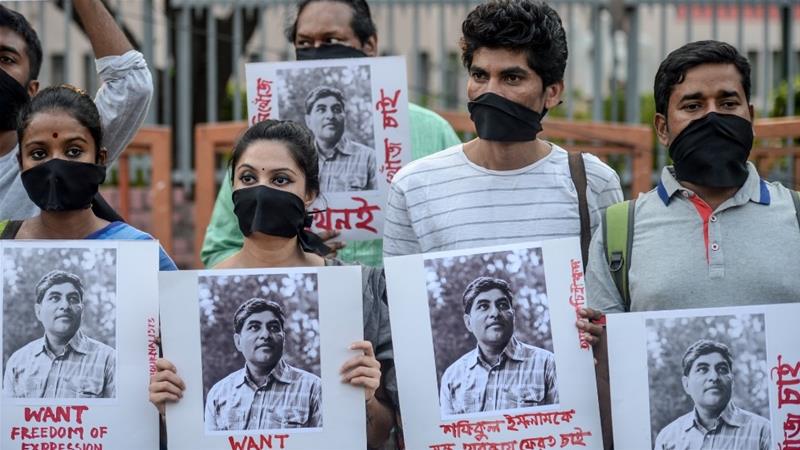- 21 May 2020

At least 20 journalists in Bangladesh have been charged or arrested under the controversial Digital Security Act (DSA) in the past month, raising concerns about free speech in the South Asian nation.
A number of journalists have been arrested for social media posts critical of the government or reporting on the government’s handling of the coronavirus pandemic.
Nearly 60 cases have been filed against more than 100 people, including 22 journalists, under the DSA this year until May 6, according to a study by Article 19, a UK-based human rights body.
Senior journalist Shafiqul Islam Kajol disappeared on March 10, a day after a politician from the governing Awami League party filed a criminal defamation case against him for publishing “false, offensive, illegally obtained and defamatory” content on Facebook.
A governing party legislator, Saifuzzaman Shikor, filed a defamation case against Kajol, a photographer and editor of the biweekly Pakkhakal magazine, and 31 others, accusing them of linking him to escort services run from a hotel.
Kajol mysteriously turned up in police custody 53 days later on India-Bangladesh border.
He has been slapped with three cases under the DSA, a law rights bodies have described as “draconian”. Police have registered a fourth case against Kajol for “trespassing” into his own country.
If punished, he faces seven years in jail.
Another top editor, Motiur Rahman Chowdhury, was also charged in the same case.
‘A prisoner of conscience’
Amnesty International said Kajol was detained for exercising his right to freedom of expression. “Shafiqul Islam Kajol is a prisoner of conscience and must be released immediately and unconditionally,” the rights body said in a statement released on May 6.
Monorom Polok, Kajol’s son, has pleaded for his father’s release. “My father still hasn’t got the chance to appeal in front of a court as the courts are now shut due to COVID -19 lockdown,” Polok told Al Jazeera.
“Out of humanity and out of kindness, we appeal to our government to consider my father’s pr-existing health conditions and his mental state and immediately release him and drop all charges against him,” he said.
Journalists filing reports critical of the government’s measures to contain the spread of the coronavirus also seemed to have been targeted.
On May 6, at least 11 people, including a cartoonist, two journalists, and a writer, were charged with “spreading rumors and carrying out anti-government activities”.
Swedish-Bangladeshi journalist Tasneem Khalil, US-based journalist Shahed Alam and blogger Asif Mohiuddin also have cases against them under DSA.
On the same day, Didarul Islam Bhuiyan, a member of a politico-civic organization, Rashtrachinta, was arrested for a Facebook post.
“My husband was not involved in any criminal acts, but he was picked up by plain-clothes people who identified themselves as members of Rapid Action Battalion (RAB),” Dilshan Ara, wife of Bhuiyan, told Al Jazeera.
“He is innocent, who merely posted some write-ups on social media criticising the corruption in the relief distribution process; we all have that right to expression under the constitution.
“We want his immediate release, he may get exposed to coronavirus inside the jail.”
Police defend action
Police officials have defended the cases against journalists.
Masudur Rahman, Dhaka Metro Police deputy commissioner media, told Al Jazeera that cases filed on May 6 against 11 people, including journalists, and Bhuiyan were filed by paramilitary RAB for social media postings.
He affirmed that the police would investigate the matter in accordance with the law. “However, it will be up to the court to decide their fate in the end. All of them have been sent to Keranigonj central jail, pending a court hearing,” Rahman told Al Jazeera.
Rights activists have expressed grave concern over the rising number of cases being filed against journalists and critics of the government. They say the DSA law is being used to “gag media and freedom of expression”.
“We are alarmed by nature and procedure followed by authorities to prosecute people in some of the cases under The Digital Security Act (DSA),” Saad Hammadi, South Asia campaigner for Amnesty International, told Al Jazeera.
“When a police official’s justification for taking a DSA case against someone is based on only the fact that a ruling party leader is aggrieved as opposed to determining the necessity and proportion of the actions, it severely compromises the country’s commitment to promote and protect people’s right to freedom of expression,” he said.
The UN High Commissioner for Human Rights has called on Bangladesh to urgently revise the DSA to ensure that it is in line with international human rights laws.
Rising cases against journalists
More than 1,000 cases have been filed in Bangladesh under the DSA since it was implemented in 2018.
In the last two months, journalists have become more vulnerable, with many media outlets announcing lay-offs due to COVID-19 pandemic that has infected 25,121 and killed 370 people in the country of 160 million.
A group of eminent citizens and journalists unions have called for the release of jailed media workers.
“Digital Security Act can be useful against those who commit cybercrimes, but it should not be used against journalists and media persons,” Farida Yeasmin, general secretary of the Bangladesh National Press Club, told Al Jazeera.
The Bangladesh Editors’ Council (Sampadak Parishad) has also expressed grave concern over the recent cases against journalists.
“No concern is being shown over the merit of the complaints before making arrests,” the Editors’ Council said in a statement.
Last month, Reporters Without Borders published a report that at least nine journalists had been physically attacked and six face charges under the DSA for collecting or publishing news on misappropriation of relief materials.
The Paris-based media watchdog ranks Bangladesh 150 out of 180 countries in its 2019 World Press Freedom Index, a four-point drop from its 2018 ranking.
Source: Al Jazeera
